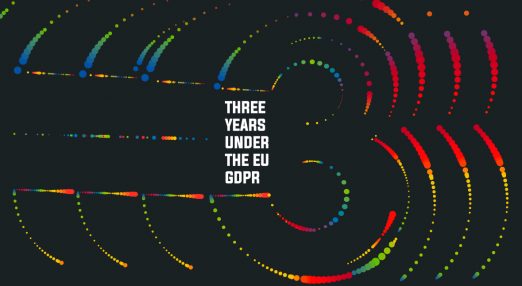EDRi-gram
Filter by...
-

EDRi-gram, 15 December 2021
In this last edition of the EDRi-gram for 2021, we look at the good, the bad and the ugly in the much-anticipated Digital Services Act report, approved by the European Parliament IMCO Committee this week. We also take a look back at this year of resilience, reflecting on the impact EDRi and the Reclaim Your Face coalition had on digital rights.
Read more
-

EDRi-gram, 1 December 2021
In this edition, we tell you how you can take your power back from Big Tech companies and help us create a democratic, fair and open internet for a just society. We are also calling on the EU to put our fundamental rights first in the Artificial Intelligence Act (AIA).
Read more
-

EDRi-gram, 17 November 2021
Check out our joint call to the Portuguese government to oppose a proposed law that tries to sneak in biometric mass surveillance. In this edition, we also explain how Facebook's latest announcement about deleting their facial recognition database demonstrates that voluntary self-regulation from tech giants is superficial and cannot replace actual legislation against these practices. And discuss the shortcomings of Facebook whistleblower's testimony.
Read more
-

EDRi-gram, 3 November 2021
In this edition of the EDRi-gram, we share EDRi's guide to help Members of the European Parliament make strong human rights choices regarding the Digital Services Act amendments prior to the IMCO vote. We also share the unfortunate news of how Europol's unfettered and problematic data-driven model of policing has been given the green light, which will lead to serious risks of discrimination based on race, socio-economic status or class, and nationality.
Read more
-

EDRi-gram, 20 October 2021
In this edition of the EDRi-gram, we share the launch of a collection of four scenarios that describe situations involving cross-border access to personal data and explains the necessary safeguards needed in the e-Evidence Proposal to mitigate these fundamental rights harms. We also demonstrate how software embedded in people’s devices can monitor our movements and surveil us, how a ban on surveillance advertising can fix Facebook and a lot more. Also now's your chance to submit your session proposal for the 10th annual Privacy Camp event, happening on January 25, 2022!
Read more
-

EDRi-gram, 6 October 2021
We celebrate a historic milestone for our human rights as the European Parliament heard what EDRi has been long advocating for and took a bold stand against unacceptably risky uses of AI like biometric mass surveillance and predictive policing. We also cheer for civil society's success in Serbia as community and international pressure forced the government to withdraw its law, threatening to subject people to oppressive and privacy intrusive biometric surveillance.
Read more
-

EDRi-gram, 22 September 2021
In this EDRi-gram, we challenge the technical ‘debiasing’ as the main solution to AI-driven structural inequality and call on policymakers to tackle the root causes of the power imbalances caused by the pervasive use of AI systems. We also look at how Big Tech platforms are harming users and join forces with EDRi's member Panoptykon Foundation, along with 49 civil rights organisations, to urge the EU to empower users and ensure effective oversight of algorithms in their amendments to the Digital Services Act.
Read more
-

EDRi-gram, 8 September 2021
In the first post-summer edition of the EDRi-gram, we are excited to announce EDRi's new staff members who have recently become part of the team. Join us in welcoming Fenya Fischler, who will be our Membership and Community Officer & Belén Luna, our new Campaigns Officer! We are also celebrating a big milestone in our signature collection to ban biometric mass surveillance as 60 000 people have signed the #ReclaimYourFace petition (hurray)
Read more
-

EDRi-gram, 14 July 2021
Whilst EU laws say that each of us is innocent until proven guilty, the prevalence of biometric mass surveillance practices across Europe flips this on its head. Each of us is treated as suspicious until ‘proven’ innocent, by often discriminatory and persecutory deployments of systems that never should have been rolled out in the first place.
Read more
-

EDRi-gram, 30 June 2021
Covid 19 brought the often invisible power of tech into sharp focus as it fostered the digitalisation of our lives forcing us to rely more heavily on technology to meet all our needs. In response, EDRi emphasised that measures taken should not lead to discrimination of any form, and governments must remain vigilant to the disproportionate harms that marginalised groups can face.
Read more
-

EDRi-gram, 16 June 2021
Some surveillance technologies are so dangerous that they inevitably cause far more problems than they solve. The use of facial recognition and remote biometric technologies in publicly accessible spaces enables mass surveillance and discriminatory targeted surveillance. In such cases, the potential for abuse is too great, and the consequences too severe. We must ban such practices once and for all.
Read more
-

EDRi-gram, 2 June 2021
The GDPR is still in its infancy, and while it is too soon to consider revisions to the law, EU regulators and decision-makers have the power to improve enforcement and fulfil its promise for vindicating data protection rights and spurring the development of privacy-protecting business models. The past three years hold important lessons for decision-makers and regulators to leverage to deliver on that promise. A lot is at stake.
Read more
